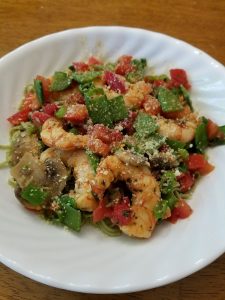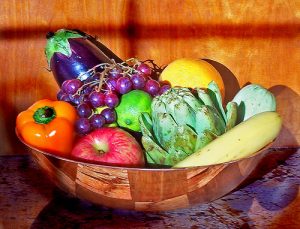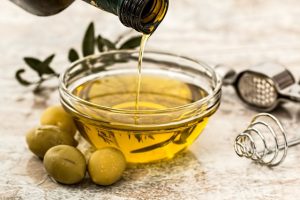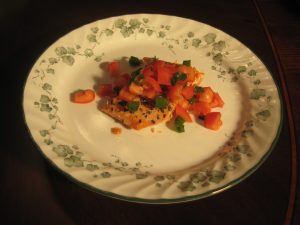 May is National Mediterranean Diet Month! I absolutely love this “diet” and personally strive to “eat the Mediterranean way” each and every day. Research has shown that eating meals like the people in the Mediterranean region promotes health and reduces risk of chronic diseases such as heart disease, high blood pressure, diabetes and cancer. By following meal plans based on the Mediterranean diet principles, you get to enjoy more fruits, veggies, whole grains, nuts, olive oil, fish and poultry.
May is National Mediterranean Diet Month! I absolutely love this “diet” and personally strive to “eat the Mediterranean way” each and every day. Research has shown that eating meals like the people in the Mediterranean region promotes health and reduces risk of chronic diseases such as heart disease, high blood pressure, diabetes and cancer. By following meal plans based on the Mediterranean diet principles, you get to enjoy more fruits, veggies, whole grains, nuts, olive oil, fish and poultry.

photo credit: Trace Nietert Eat healthy fruits and veggies bowl via photopin (license)
There are all kinds of delicious and satisfying foods in the Mediterranean diet. And the guidelines are actually pretty simple. The majority of your intake comes from fruits and veggies. It is best to strive for at least 5 to 9 servings of fruits and veggies each day. Eating the colors of the rainbow are key, so be sure to include a variety of colorful fruits and veggies such as peppers (red, green, yellow, orange), onions (red, yellow, green), melons (cantaloupe, honeydew, watermelon), squashes (zucchini, yellow, butternut, acorn, spaghetti), berries, stone fruits (nectarines, peaches) leafy greens and cruciferous veggies (broccoli, cabbage, cauliflower, and Brussels sprouts).

photo credit: philipp.alexander.ernst SUPERFOOD: Quinoa via photopin (license)
Next on the list of foods within the Mediterranean diet are whole grains. These powerhouse carbs are chock full of fiber (which helps to promote increased satiety between meals) and B vitamins (aka the spark plugs for the body). My favorite whole grains include quinoa, bulgur, farro, barley, brown rice, and oatmeal. Simply swapping regular pasta with a whole wheat variety does the trick too, but sometimes flavor can lack. My favorite substitute for pasta is farro, an ancient grain that has a nutty taste and is rich in magnesium and iron. It is also an excellent source of protein and fiber. My favorite substitute for rice is bulgur. Bulgur is a less known whole wheat durum grain that is a rich source of magnesium, manganese, and iron. It is also chock full of other phytonutrients and antioxidants. But this is the why I love bulgur instead of brown rice…..just 1 cup per day can give you 25% of your dietary fiber needs! This is excellent way to protect your body from cardiovascular disease and keep your GI track in tip-top shape.
 You simply cannot talk about the Mediterranean diet without mentioning olive oil. This is the oil of choice in the Mediterranean diet because of its strong antioxidant properties. Key is to vary your olive oil so that you don’t get tired of the same old taste. Mix it up between extra-virgin and virgin. I don’t recommend the light olive oil variety because it is not 100% pure olive oil. Rather light olive oil is a mixture of virgin and other refined oils. This means that it lacks the antioxidant nutrients found in extra-virgin and virgin varieties. Goal intake should be about 4 Tbsp. per day.
You simply cannot talk about the Mediterranean diet without mentioning olive oil. This is the oil of choice in the Mediterranean diet because of its strong antioxidant properties. Key is to vary your olive oil so that you don’t get tired of the same old taste. Mix it up between extra-virgin and virgin. I don’t recommend the light olive oil variety because it is not 100% pure olive oil. Rather light olive oil is a mixture of virgin and other refined oils. This means that it lacks the antioxidant nutrients found in extra-virgin and virgin varieties. Goal intake should be about 4 Tbsp. per day.
 Another hallmark of the Mediterranean diet is nuts and seeds. Goal intake of these yummy treats is 3 ounces per week! So yes, it is great to have more nuts and seeds in your diet, however, going overboard with the serving sizes will add inches to your waistline. My recommendation is that a little goes a long way. For example, at breakfast use 4 walnut halves on top of your cereal, and at snack time pair 6 almonds with a serving of fruit or 16 pistachios with 1 cup of raw veggies. Also don’t forget about nut butters. A great snack would be to have 1 Tbsp. of your favorite nut butter with apple or pear slices. By keeping your portions in check your waistline will be thankful as well as your heart.
Another hallmark of the Mediterranean diet is nuts and seeds. Goal intake of these yummy treats is 3 ounces per week! So yes, it is great to have more nuts and seeds in your diet, however, going overboard with the serving sizes will add inches to your waistline. My recommendation is that a little goes a long way. For example, at breakfast use 4 walnut halves on top of your cereal, and at snack time pair 6 almonds with a serving of fruit or 16 pistachios with 1 cup of raw veggies. Also don’t forget about nut butters. A great snack would be to have 1 Tbsp. of your favorite nut butter with apple or pear slices. By keeping your portions in check your waistline will be thankful as well as your heart.
 Fish is king of the protein selections in the Mediterranean diet. Not all fish are created equal, for in the Mediterranean diet you want to eat more fatty fish such as salmon, tuna, and mackerel so you can capitalize on their high quantities of omega-3 fatty acids (cardio-protective fats). It is best to strive to eat fish at least 3 times per week. When you are not eating fish, then it is good to use lean white meat poultry or beans and lentils as your protein source. Shellfish such as shrimp, crab, and scallops are also good as a lean protein source, but they do not have as much omega-3 fatty acids as the fish varieties.
Fish is king of the protein selections in the Mediterranean diet. Not all fish are created equal, for in the Mediterranean diet you want to eat more fatty fish such as salmon, tuna, and mackerel so you can capitalize on their high quantities of omega-3 fatty acids (cardio-protective fats). It is best to strive to eat fish at least 3 times per week. When you are not eating fish, then it is good to use lean white meat poultry or beans and lentils as your protein source. Shellfish such as shrimp, crab, and scallops are also good as a lean protein source, but they do not have as much omega-3 fatty acids as the fish varieties.
Lastly, herbs and spices are key to cooking the Mediterranean way. It is best to use plenty of fresh or dried herbs and spices instead of salt in your cooking. Many of the herbs and spices have antioxidant properties to benefit your health. Just avoid any herb blends, since many contain salt as part of the blend. It is best to buy salt free spice blends or make your own blends from your spice rack.

0 Comments